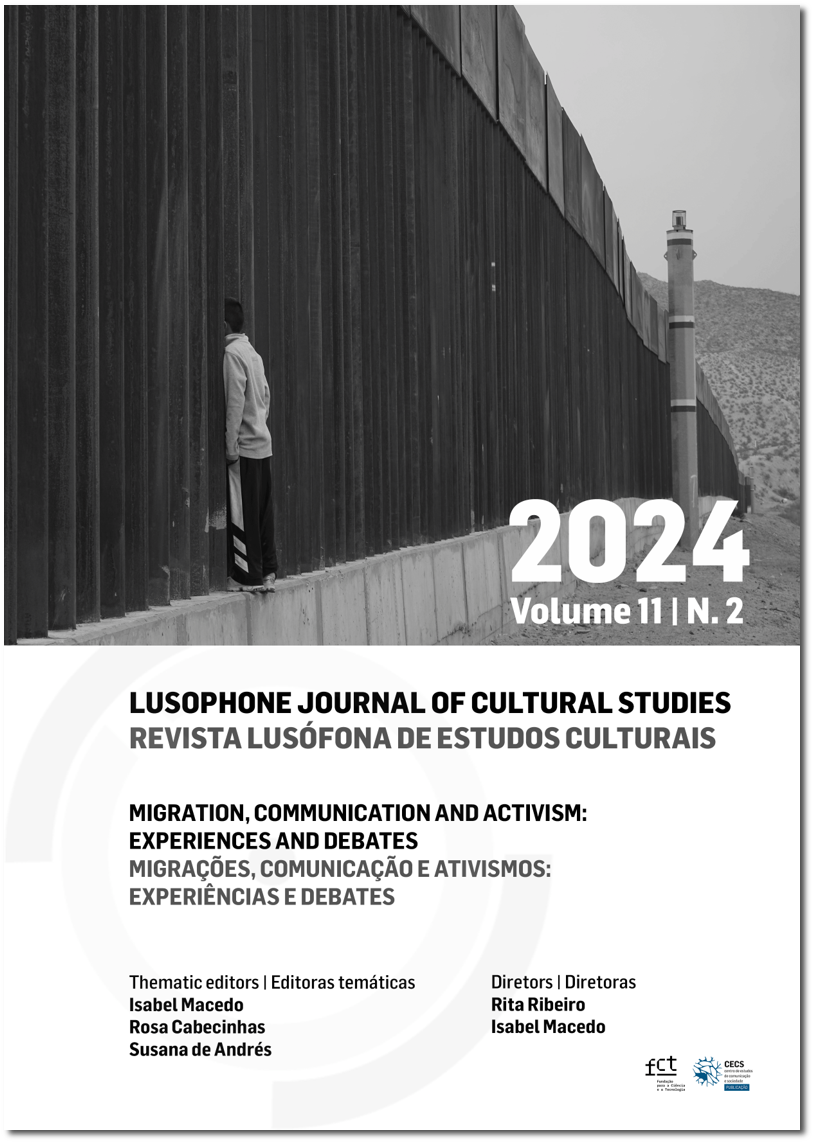Decolonial Constellations: The Post-Museum as a Space for Interculturality and Resistance
DOI:
https://doi.org/10.21814/rlec.5739Keywords:
decolonial constellation, interculturality, cultural resistance, postcolonial studies, post-museumAbstract
Just as a constellation is made up of individual stars that, when together, create a meaningful representation, decolonial constellations suggests the interconnection of diverse decolonial images, practices and movements that together form a broader, more comprehensive picture of resistance. It suggests the inclusion of multiple perspectives, voices and experiences from different cultures. Similar to constellations, made up of multiple points of light, each image, thought, perspective contributes to mapping and navigating cultural and historical territories that are peripheral to or are suppressed by colonialism, recovering and valuing these spaces through a decolonial approach. In this research, we have adopted a decolonial perspective of interculturality (Martins, 2020; Mignolo & Walsh, 2018), which understands it as a genuine dialogue between peoples and institutions, seeking to promote equal opportunities. The methodological approach is qualitative, based on bibliographical research that explores the concepts of interculturality, decoloniality and post-museality. Throughout this article, we analyse some museums that are transforming their exhibitions and narratives in favour of a decolonial perspective. We explore the African Museum, in Belgium; the Pitt Rivers Museum, in Great Britain; and the Virtual Museum of Lusophony, on Google Arts & Culture, physically based in Portugal. These museums will be presented as case studies that exemplify the approach to the post-museum paradigm.
Downloads
References
Belting, H. (2006). O fim da história da arte: Uma revisão dez anos depois. Cosac Naify.
Bourdieu, P. (1989). O poder simbólico (F. Tomaz, Trad.). Difel. (Trabalho original publicado em 1982)
Cabecinhas, R. & Cunha, L. (2008). Da importância do diálogo ao desafio da interculturalidade. In R. Cabecinhas & L. Cunha (Eds.), Comunicação intercultural: Perspectivas, dilemas e desafios (pp. 7–12). Campo das Letras.
Carvalho, C. A. (2019). Moisés de Lemos Martins: “O português é uma língua não só de comunicação, mas também de culturas, pensamento e conhecimento”. MATRIZes, 13(1), 93–106. https://doi.org/10.11606/issn.1982-8160.v13i1p93-106
Chibelushi, W. (2023, 2 de outubro). Dr Denis Mukwege: Nobel Prize-winner to contest DR Congo presidency. BBC News. https://www.bbc.com/news/world-africa-66984440
DeBlock, H. (2019). The Africa Museum of Tervuren, Belgium: The reopening of “the last colonial museum in the world”, issues on decolonization and repatriation. Museum & Society, 17(2), 272–281. https://doi.org/10.29311/mas.v17i2.3066
Enwezor, O. (2003). The postcolonial constellation: Contemporary art in a state of permanent transition. Research in African Literatures, 34(4), 57–82.
Fanon, F. (1968). Os condenados da terra (J. L. Gomes, Trad.). Editora Civilização Brasileira. (Trabalho original publicado em 1961)
Faria, L. M. (2021, 8 de novembro). National Gallery de Londres publica dados sobre envolvimento de fundadores, doadores e artistas seus no tráfico de escravos. Expresso. https://expresso.pt/cultura/2021-11-08-National-Gallery-de-Londres-publica-dados-sobre-envolvimento-de-fundadores-doadores-e-artistas-seus-no-trafico-de-escravos-a43e3ef7
Fundação Calouste Gulbenkian. (2023, 27 de setembro). Yassmin Forte vence Prêmio de Fotografia Africana Contemporânea. https://gulbenkian.pt/noticias/yassmin-forte-vence-premio-de-fotografia-africana-contemporanea/
Hicks, D. (2020). The brutish museums: the Benin bronzes, colonial violence and cultural restitution. Pluto Press.
Hooper-Greenhill, E. (2000). Museums and the interpretation of visual culture. Rout-ledge.
Huyssen, A. (1987). After the great divide: Modernism, mass culture, postmodernism. Indiana University Press.
Martins, M. L. (Ed.). (2015a). Apresentação: Lusofonias – Reinvenção de comunidades e combate linguístico-cultural. In M. L. Martins (Ed.), Lusofonia e interculturalidade: Promessa e travessia (pp. 7–23). Edições Húmus; Centro de Estudos de Comunicação e Sociedade. http://hdl.handle.net/1822/39693
Martins, M. L. (2015b). Média digitais e lusofonia. In Martins, M.L. (Ed.). Lusofonia e interculturalidade: promessa e travessia (pp. 27–56). Edições Húmus; Centro de Estudos de Comunicação e Sociedade. http://hdl.handle.net/1822/39693
Martins, M. L. (2018). Os países lusófonos e o desafio de uma circum-navegação tecnológica. Comunicação e Sociedade, 34, 87–101. https://doi.org/10.17231/comsoc.34(2018).2937
Martins, M. L. (2020). Tecnologia e literatura: As narrativas transmediáticas. Letras de Hoje, 55(1), 4–13. https://doi.org/10.15448/1984-7726.2020.1.34786
Martins, M. L., Sarmento, J., & Costa, A. (2020). Museus, coleções e exposições, coloniais, anticoloniais e pós-coloniais: Nota introdutória. Revista Lusófona de Estudos Culturais, 7(2), 7–12. https://doi.org/10.21814/rlec.3133
Mignolo, W. (2008). Desobediência epistêmica: A opção descolonial e o significado de identidade em política. Cadernos de Letras da UFF – Dossiê: Literatura, língua e identidade, (34), 287–324.
Mignolo, W. & Walsh, C. (2018). On decoloniality: Concepts, analytics, praxis. Doke University Press.
Museu Virtual da Lusofonia. (s.d.). Agora... Acontece! (ep. 250; Carlos Pinto Coelho) [Vídeo]. YouTube. https://www.youtube.com/watch?v=NzUFo1mzol0&t=462s
Pitt Rivers Museum. (2017). Strategic plan 2017 to 2022. Oxford University/Pitt Rivers Museum.
Quijano. A. (2007). Colonialidad del poder y clasificación social. In S. Castro-Gómez & R. Grosfoguel (Eds.), El giro decolonial: Reflexiones para una diversidad epistémica más allá del capitalismo global (pp. 93–126). Siglo del Hombre Editores.
Sarmento, J., & Martins, M. L. (2020). À procura de Moçambique no Museu Nacional de Etnologia, Portugal. Revista Lusófona de Estudos Culturais, 7(2), 15–32. https://doi.org/10.21814/rlec.3132
Vergès, F. (2023). Decolonizar o museu: Programa de desordem absoluta (M. Echalar, Trad.). Ubu Editora. (Trabalho original publicado em 2018)
Walsh, C. (2003). Las geopolíticas de conocimiento y la colonialidad del poder. Entrevista a Walter Mignolo. Polis, Revista de la Universidad Bolivariana, 1(4), 1–26.
Walsh, C. (2019). Interculturalidade e decolonialidade do poder: Um pensamento e posicionamento “outro” a partir da diferença colonial. Revista da Faculdade de Direito de Pelotas, 5(1), 6–39. https://doi.org/10.15210/rfdp.v5i1.15002
Downloads
Published
How to Cite
Issue
Section
License
Copyright (c) 2024 Elaine Trindade, Moisés de Lemos Martins

This work is licensed under a Creative Commons Attribution 4.0 International License.
Authors own the copyright, providing the journal with the right of first publication. The work is licensed under a Creative Commons - Atribuição 4.0 Internacional License.








